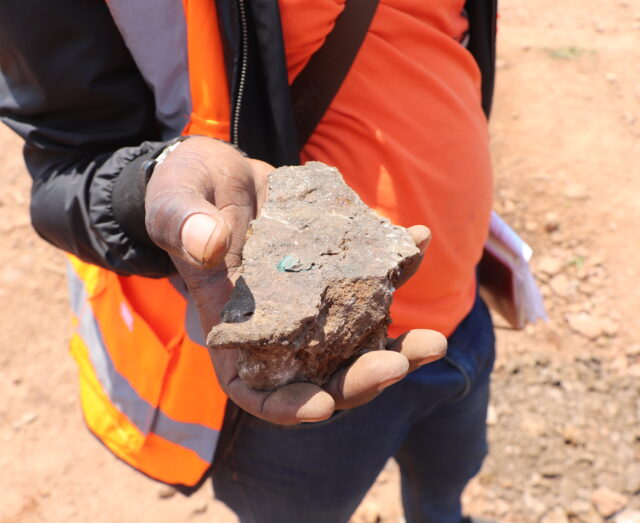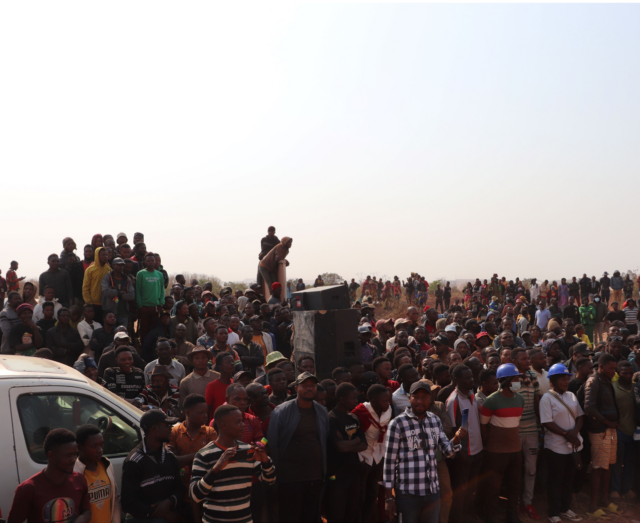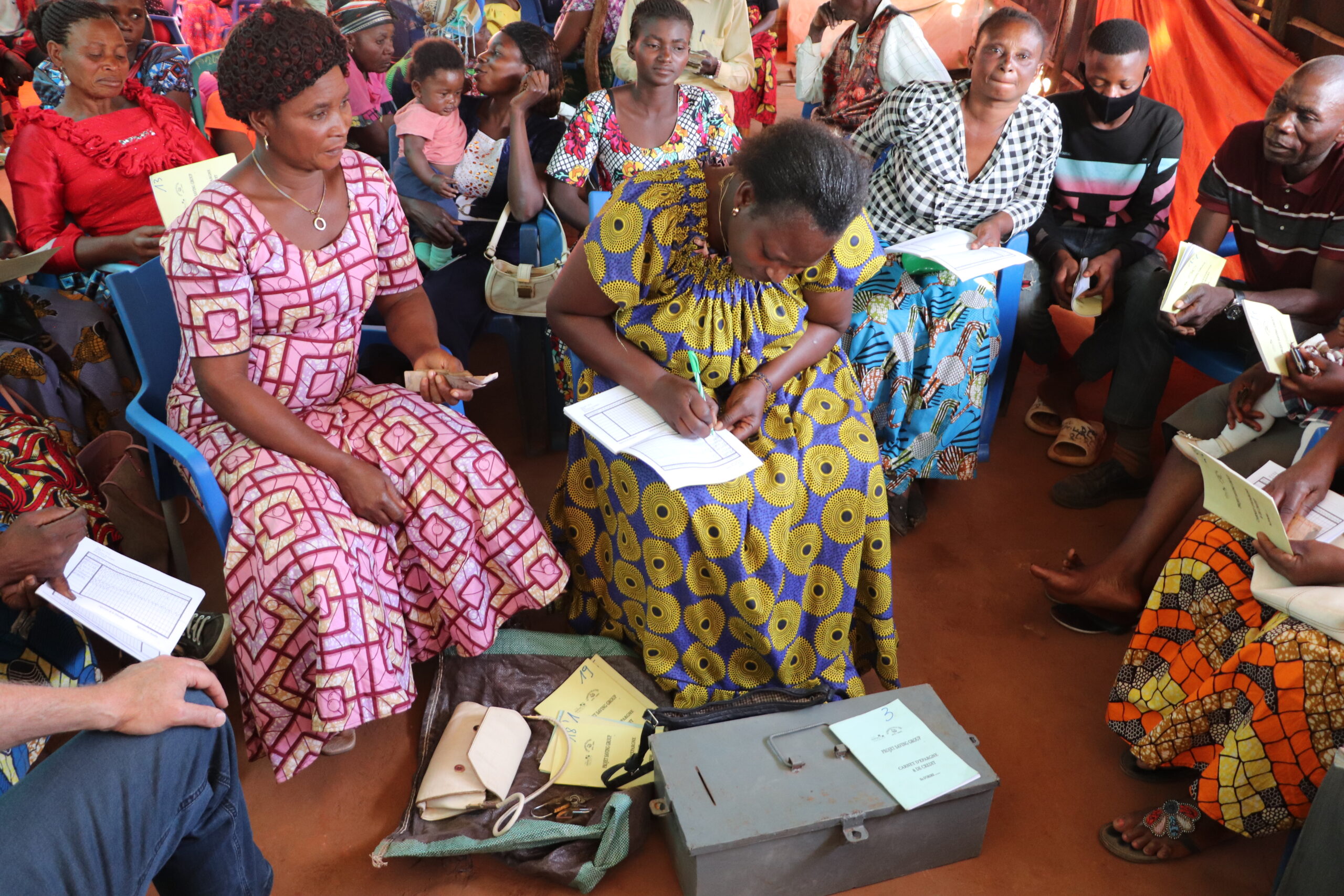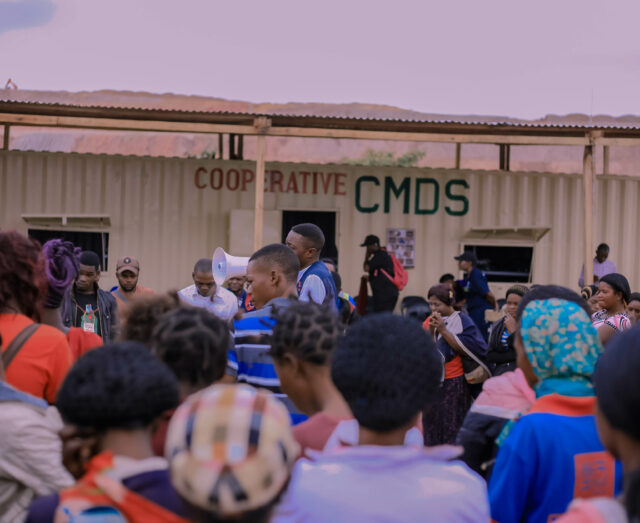FCA Quarterly - Q2 2023
In the second quarter of 2023, the FCA continued to make progress in its efforts to support the transformation of the artisanal cobalt sector in the DR Congo.
Achieving tangible impact in artisanal cobalt mining communities
The Fair Cobalt Alliance’s strategic approach to achieving its objectives and tangible impact in artisanal cobalt mining communities comprises five different workstreams geared towards improving the ground conditions of artisanal miners. In this section, we highlight our team’s activities in realising our goals, separated into these five workstreams geared towards improving the ground conditions of artisanal miners.
Mine site expansion and legalization support
Legalisation
To be aligned with the law and bring support to our partner CMDS after the signing of the MOU in 2022, the FCA has continued its efforts to legalise the Kamilombe mine site. The FCA and the law firm(s) have now entered the second phase of the process which is the discussion with relevant stakeholders to ensure that the rule of law is upheld. The next step will include the formalisation of the discussion through the signing of an MoU or a contract with the permit owner and relevant stakeholders.
 Enabling safe and dignified working conditions
Enabling safe and dignified working conditions
PPE distribution
Following the provision of PPE to the women washers of Kamilombe, the FCA has been working with the miners to put in place rechargeable lamps to facilitate the work and ensure safety. Concurrently, the FCA and the CMDS team are working on a rental and rechargeable system for the miners to access the additional PPE.
The goal of the FCA is to ensure that safety measures are respected to reduce accidents and prevent any diseases or contamination during mineral extraction and processing. As a step toward having all mine workers have PPE, the FCA was able to provide shirts to all 100 safety captains. The safety captains are the miners who have received the FCA training and ensure that all safety measures are respected. There is also a project in place to procure gloves, goggles, and masks for all mine workers who work in the depots to ensure that they are well protected as they are the ones crushing and testing the quality of the minerals.
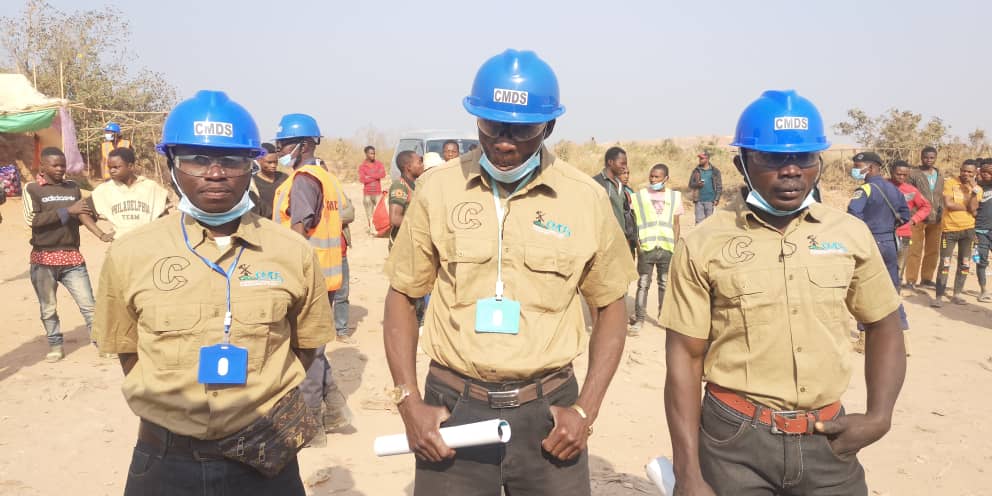
Safety captains during the Monday morning safety gathering, take time to socialise OHS with their peers.
Operational Health & Safety (OHS)
As part of the OHS, the FCA in collaboration with the CMDS management has worked on installing signs throughout the mine site to ensure safety measures are remembered and respected. The signs are written in Swahili to ensure better understanding and remind the miners of the crucial need to respect the safety measures, wear their PPE, and not allow kids on site.
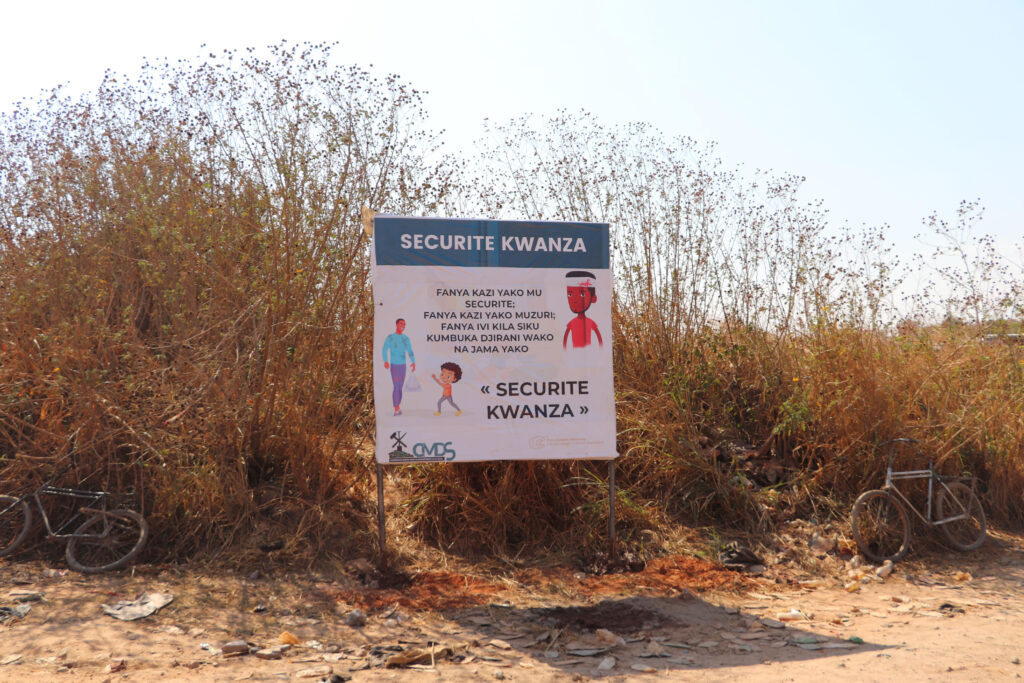
Swahili safety signs in Kamilombe reading, ”Safety first: Do your work with safety, Do it every day, Think of your family and your neighbour. Safety first”
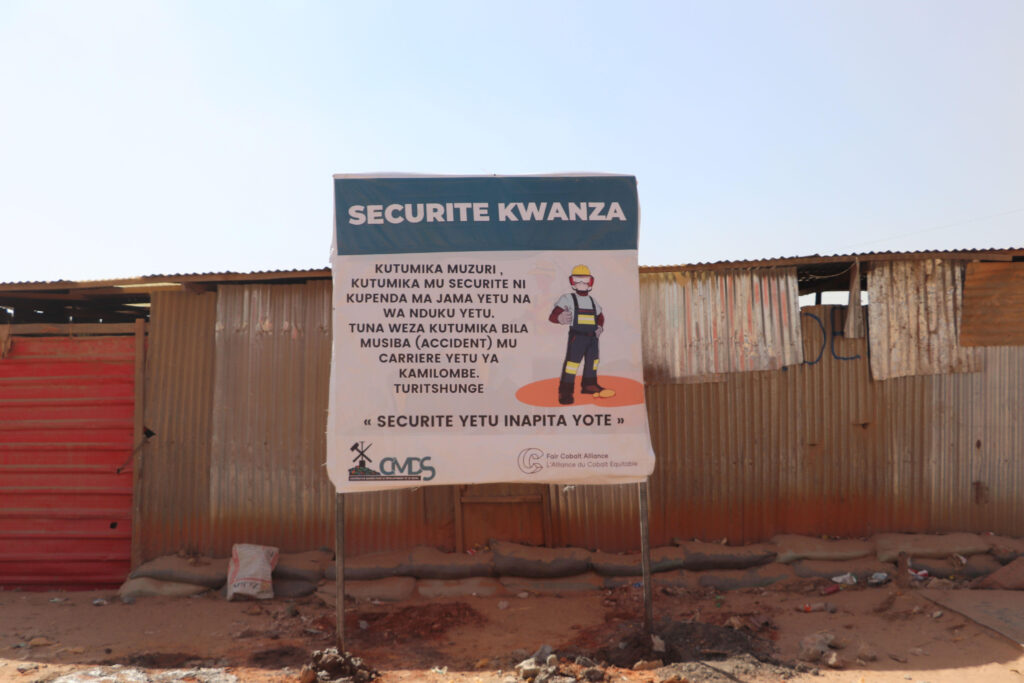
Swahili safety signs in Kamilombe reading, “Safety first: To work well and safely is to love your family and your brothers. We can work without accidents in our Kamilombe quarry. Let’s protect ourselves. Our safety is more important than anything else.”
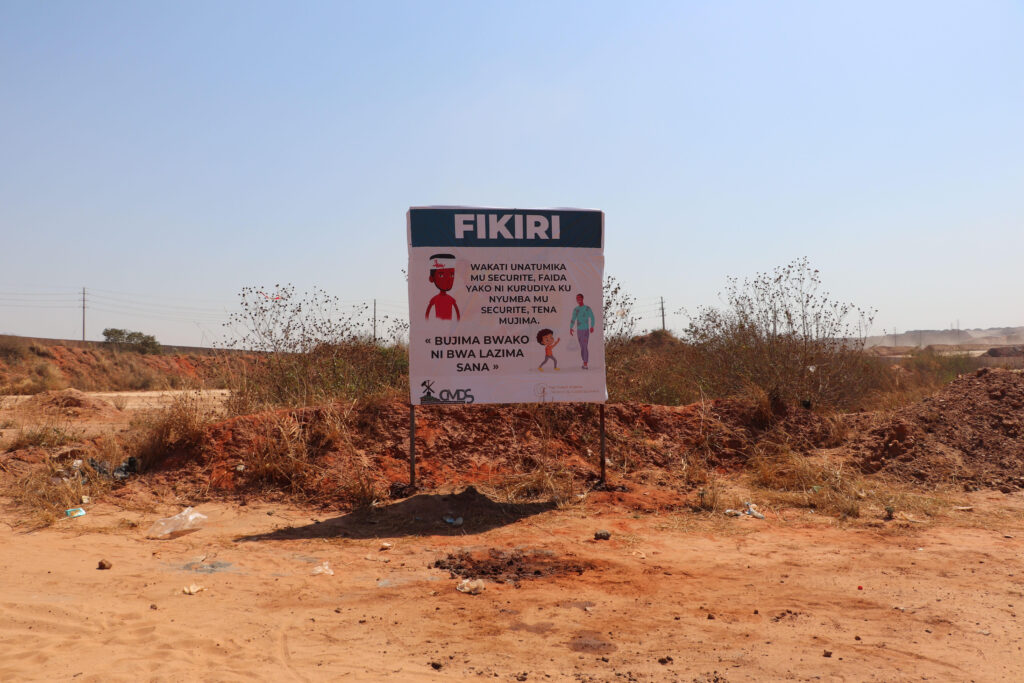
Swahili safety sign in Kamilombe reading, “Be careful: When you work safely, it’s in your interest to come home safe and alive. Your life is important.”
Child labour remediation
The FCA, Save the Children and the Centre’s team continue to work on the establishment of the Hub.
5 more children have been onboarded into the Child Labour Remediation (CLR) System. 8 children in total are currently being remediated. Additional information about The Hub is available here.
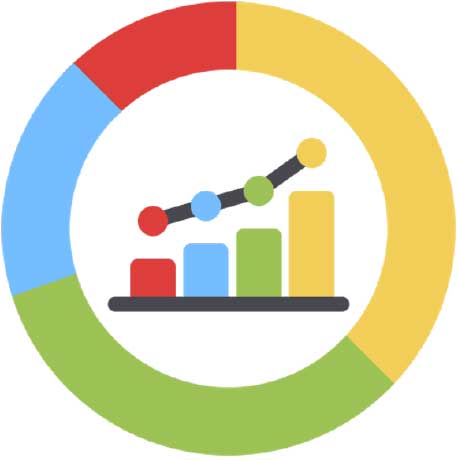
Raising worker incomes
Saving groups
As previously mentioned in Q1, in addition to the 14 groups, the FCA has signed a contract of USD 50,000 to add 10 additional groups and continue guiding the 14 existing groups.
Up to the end of June 2023:
- – $24,689.6 as savings funds mobilised in this quarter;
- – $1,113.89 as solidarity funds mobilised for the period;
- – 247 people gained access to credit;
- – $26,287.62 in credit granted to AVEC members;
- – 423 people participate in savings activities;
- – 21 groups are operational, including 10 new groups and 11 old groups groups

Achieving market acceptance of Fair ASM Cobalt
Supply Chain Integration task force
The supply chain integration task was convened with eight members of the FCA to ensure that the FCA integrates responsible cobalt from the ASM mine sites into global supply chains and downstream companies’ products – one of the organisation’s goals. This is because physical integration into direct supply chains remains a longer-term goal due to the supply chain setup being still in flux, and indicators like mine legality pose a problem for direct downstream engagement.
Given these factors, the FCA has pivoted and prioritised the development of the cobalt credit scheme as a more immediate solution to connect downstream cobalt users with the production upstream and, through this model, channel investment into the mine sites and drive continuous improvements to enable their ultimate compliance with certain standards such as the RMI framework.
A basic chain of custody on the site is being set up, which will help physically integrate cobalt into formal mine sites in the future. The team on the ground has been working to create documentation on production indicators, proof points and tools for sharing with the task force. A premium allocation committee will be created at the mine site level, which will include cooperative members and workers representatives, that define priorities for further improvement in line with the four mine site priorities listed here: Improved occupational health and safety, Child Rights Protection, Improved conditions for workers and surrounding communities and business professionalisation at the mine site.
M&E Framework
The framework, whose development started in November 2023, was created to measure and evaluate the impact of all FCA interventions to gauge progress against the goals of the organisations and, as such, inform priority setting for the FCA. The work is based on the workstreams initially defined by the FCA, looking at inclusive economic development, child labour remediation, safe and dignified working conditions and the overall environment to increase industry acceptance for ASM cobalt.
All workstreams are linked to a detailed results chain that outlines each workstream’s activities, outputs and outcomes. The framework is not static; the activities will change over time based on progressive learning. Multiple feedback rounds have occurred at the Steering Committee level and with external parties, finalised in February and March, and developed into comprehensive questionnaires rolled over to 96 different mine workers, 19 women workers and 95 community members. An external consultant collected the baseline data.
In the future, the FCA will undertake the data collection for cost saving but will leverage external third-party validation for verification. Data collection was finalised in May and analysis started in June. From that, the Secretariat will develop an adjusted measurement framework, factoring in the baseline survey results to limit the indicators to those that the Secretariat is confident in their implementation.
Some indicators, for example, improving workers’ income, have proved challenging to measure and, as such, may have to be measured using a different methodology in future surveys.
Creating an enabling environment
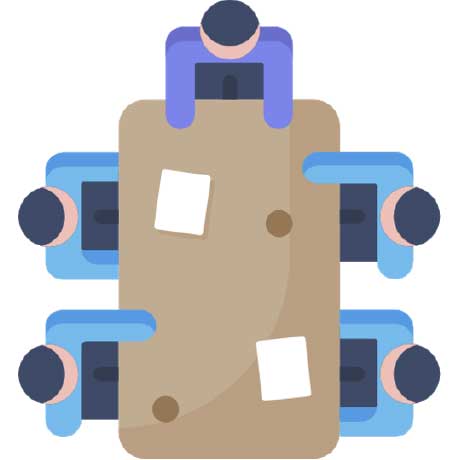
On June 22, The FCA held its first Advisory Board Meeting, introducing the new Country Director, Antoine Kasongo, and the new AB member, Brieuc Debontridder, to the members of the board. The key discussion points for the meeting were to get relevant feedback from the members on the ASM Cobalt Credits, largely known as the Responsible Mineral Credits, the draft concept for which is still under development by the Supply Chain Integration Taskforce, and to provide an update on the M&E Framework of the FCA; a baseline survey of the indicators was rolled out to the mining community and the results are currently being reviewed.
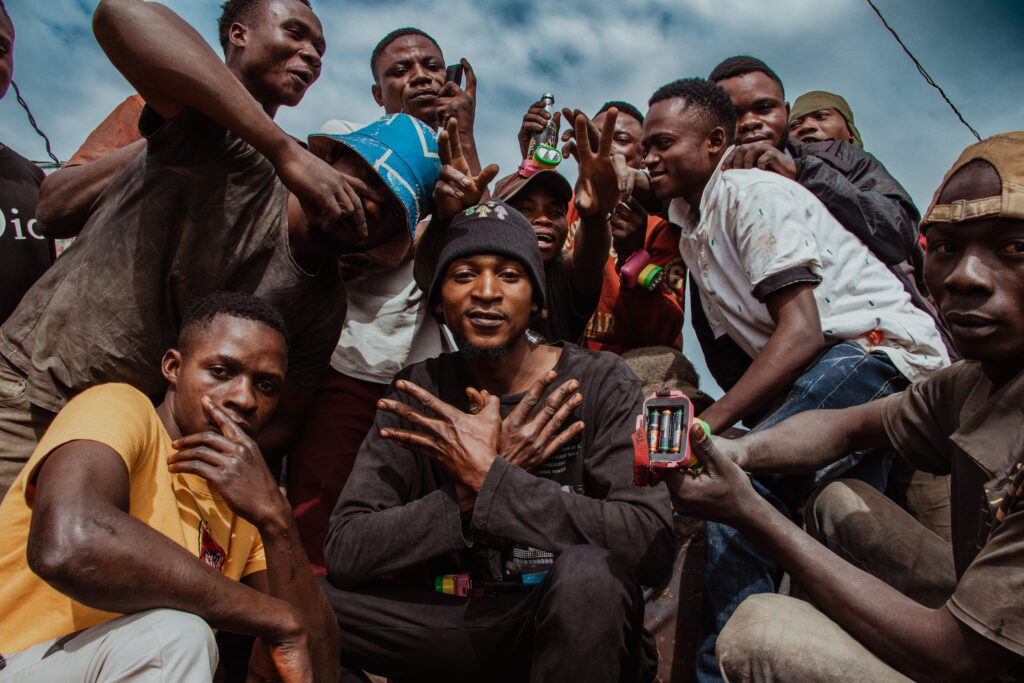
The artisanal cobalt mining sector contributes roughly 7-15% of global cobalt production. Cognisant of the harsh working conditions that artisanal miners endure on a daily basis with such optimism, perseverance and resilience, the FCA hopes to contribute to a more nuanced portrayal of the artisanal sector as a crucial livelihood to thousands of people challenging the one-sided over-simplified displays of the sector that dominate current public discourse. Copyright, Olivier Delafoy.
 Forging strategic partnerships & government relations
Forging strategic partnerships & government relations
From June 14th – 16th, the FCA team was represented at the DRC Mining Week conference in Lubumbashi, DR Congo, – the biggest mining sector conference in the DRC where the FCA was a cobalt sponsor. The FCA sponsored a panel discussion on the main stage on the importance of investing in the ASM sector and used the opportunity to connect with financial entities and downstream actor representatives to forge new partnerships and raise the visibility of our work.
The local DR Congo team participated in an atelier organised by the Conseil Presidentiel de Veille Strategique (CPVS). This atelier was put in place to start a conversation between ASM and LSM and foster the coexistence of these two groups.

Outreach, Fundraising & Recruitment
Through the FCA Comms team, the FCA has provided support for the Cobalt Institute’s Journalist visit that occurred on the week after the DRC Mining Week in June. The visit included a visit to the Kamilombe mine site where the FCA team, together with CMDS, provided a nuanced perspective on the ASM sector to media representatives, market analysts and third-party representation from GIZ, the PPA, USAID and the RMI. The participants, also taken to an industrial mine site, were able to see the differences between the large-scale sector and ASM and acknowledge the changes that need to happen for the professionalisation of the ASM sector.
The team in the last quarter participated in-person or online in the following events: CI Journalist Visit, Responsible Raw Materials 2023 online conference, BMZ’s High-Level Forum in Berlin (Extractives for Development), Evolve: Assent’s supply chain sustainability conference, Mines and Money, World Association of Mining Lawyers Annual Conference, The Global Sustainable Development Congress, DRC Mining Week – Lubumbashi, FCA Member Meeting, Paris Peace Forum, Cobalt Congress, and OECD Conference, represented by different members of the FCA in-country and international team. The team was also invited to participate in two webinars in the last quarter, one organised by the International Council on Metals and Minerals (ICMM) and the other by the Schumacher Center – Creating a Global Renewable Energy Commons.
The secretariat leveraged event attendance in the last quarter to get into contact with other companies for future FCA membership and to display two photo exhibitions on ASM, one at the Cobalt Congress in Istanbul and the other at the Belgium Embassy during the DRC Mining Week, in collaboration with Mining & Business Magazine and two other photographers, Brieuc Debontrider, the author of République démocratique du Cobalt and Olivier Delafoy, the Editor at Mining & Business.
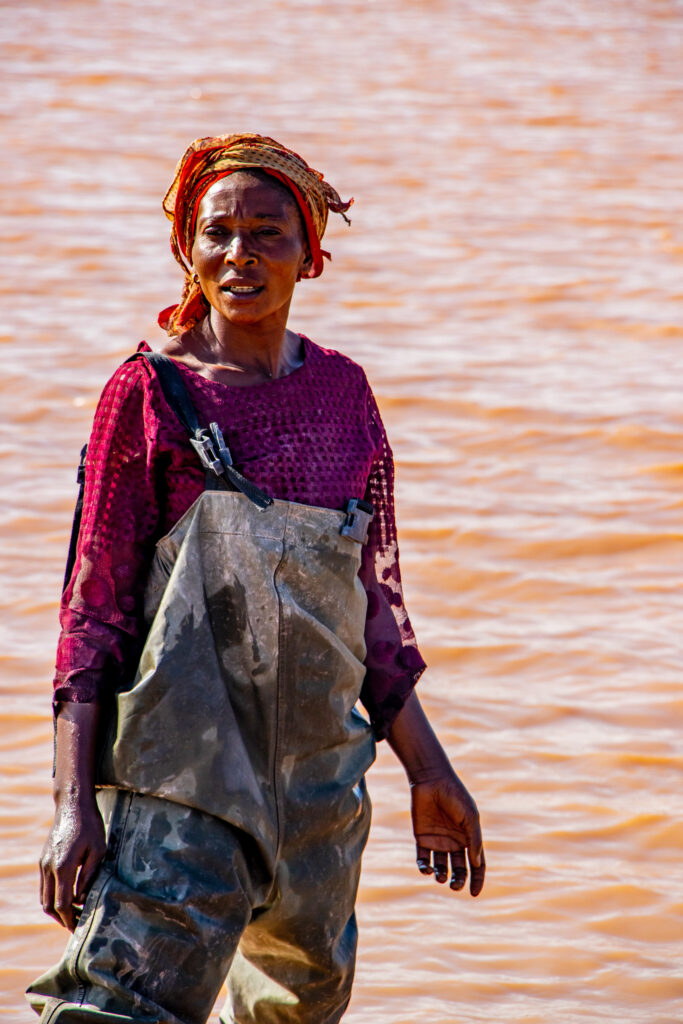
Contrary to popular belief, artisanal cobalt mining activities are relatively well-paying compared to other alternatives in the region. Income for creuseurs working underground fluctuates based on the international commodity prices. Laveuses, on the other hand, are usually paid per bag of minerals processed, netting between USD 150-250 per month. To put this into perspective, David Sturmes, a member of the FCA team recently met one of the women working at Kamilombe who shared that being able to collect payment daily collectively exceeded her previous salary, leading to her decision to quit her job and pursue a livelihood washing minerals.
Relevant blogs and publications
ABC News | February 8 | Artisanal cobalt mining swallowing city in Democratic Republic of the Congo, satellite imagery shows
Fair Cobalt Alliance (FCA) | April 9 | 2023 – FCA Quarterly – Q1 2023
Susanova | April 19 | Apple aims to use 100 percent recycled cobalt in batteries by 2025
Finnish Business Weekly | April 26 | Justin, 31, manually digs for cobalt in the Congo, which is also found in the batteries of Finns’ mobile phones and cars – but is that a problem?
Africa Review | May 2023 | A new narrative around artisanal mining
Mines.cd | June 2023 | Lualaba: ACE and Glencore visited the construction works of the Kamilombe mine site hospital financed by the CMDS



